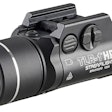TASER International has won a major lawsuit with a summary judgment. The company announced that on Nov. 20, the U.S. District Court for the Northern District of California entered an order and judgment for TASER in the arrest-related-death lawsuit titled Rosa v. TASER International, et al., granting TASER's motion for summary judgment.
Plaintiffs were represented in the Rosa case by California attorneys: John C. Burton, Peter M. Williamson, John F. Baker, and Peter T. Cathcart. Plaintiffs filed their lawsuit in 2005, and aggressively litigated their case for four years. The medical examiner had determined cause of death was from the methamphetamine Rosa ingested.
The Court noted that "California courts require that plaintiffs present evidence of 'general recognition and prevailing best scientific and medical knowledge' to meet the 'known or knowable' element of a strict liability claim." In addition, the court noted that the "evidence is insufficient as a matter of law to raise a triable issue as to 'knowability' of the risk,... [and] insufficient to create a triable issue as to whether TASER should have known of the risk."
The Court also noted that "TASER has developed a comprehensive warning system in which every ECD sold or distributed is accompanied by a training CD/DVD and operating manual to be used by TASER-certified instructors," and that the defendant's expert Dr. Raymond Fish "unequivocally rejects the theory that ECDs on humans decrease respiration and cause dangerous acidosis."
In granting TASER's motion for summary judgment, the Court stated that TASER International's assertions "are well-taken" that there are no genuine issues of material fact with regard to whether, "the alleged propensity of ECDs to cause metabolic acidosis was known or knowable on Dec. 30, 2003, when the ECDs in question were shipped from TASER to its distributor; [and]... TASER's warnings with respect to the dangers posed by application of its ECDs were adequate..."
"It is important to note that this case was brought by the same plaintiff's counsel, using fundamentally the same liability theory as the Heston case in 2008," and "it is ironic that this case is won in the same week as TASER filed its opening appellate brief in the 9th Circuit Court of Appeals in the Heston case" said Doug Klint, president and general counsel of TASER International. "Studies published since the Heston trial have largely disproven the acidosis theory, demonstrating that the exertion effects associated with TASER ECD discharges are lower than several other physical force tactics. We believe the findings from the court in this most recent case is an important landmark for both law enforcement and the company. TASER International will continue to aggressively defend all litigation filed against the company and will seek all recoverable costs from plaintiffs."














